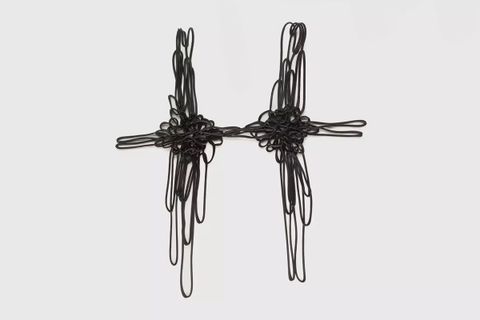Kasia Kucharska Is Constantly Innovating
The third edition of BERLIN, BERLIN has arrived. From in-person pop-ups and parties, to exclusive content and products, we're delving into Berlin's creative culture. Explore the content here and browse the drops here. BERLIN, BERLIN is made possible thanks to support by the Berlin Senate Department for Economics, Energy and Public Enterprises.
It's only been a year since we last caught up with Kasia Kucharska, Wanda Wollinsky, and Reiner Törner, the trio behind the Berlin-based label Kasia Kucharska, but a lot has happened in those 12 months.
When we last spoke, the brand had just been announced as the winner of our BERLIN, BERLIN Prize, receiving €20,000 to go towards the brand's development. Since then, Kasia Kucharska has: presented in Milan with 032c, moved studios, gotten wholesale orders, run its first in-person events in Berlin, launched its second collection... oh yeah, and everyone from Julia Fox to the AI influencer Miquela has been wearing its pieces.
"It was, for us, a year to really start off. Because before we got the prize we were only just starting to work as a brand," says Kucharska, who is calling in from a research trip (mixed with a bit of vacation time) in Austria, while her two colleagues join the call from its Berlin-based studio.
It's rare for a fashion label to have a new never-seen-before technique in its inception but, after a long development process, Kasia Kucharska has managed to enter the market with a truly unique latex material.
"I experimented with liquid materials and pouring surfaces by hand during my Master's collection. I was playing around and developing these prototypes of garments that were, back then, ready-mades," says Kucharska. "When I started to share them, especially on Instagram, there was an immediate response and I got great feedback from different people; stylists, wholesale stores, and people wanting to wear the garments."
Being a natural material, latex is biodegradable and working with its liquid form means a zero-waste production process — as well as it being more elastic, durable, and flexible.
But, all those benefits don't come easily: "it's a bitch to work with because it responds to the atmosphere, to temperature," says Kucharska. "We work with the fluids, with the liquid material, so when it's hot in the summer it dries faster."
Together with Wanda Wollinsky and Reiner Törner, two close friends who she met at Universität der Künste in Berlin, she has been fighting the elements to turn a time-consuming handmade technique into something reproducible for commerce — and they have never stopped: "It's a constant process, and it's still going. We're still not done with it," says Kucharska.
Kasia Kucharska is known for its unique squiggly pattern — an aesthetic that is most easily described as looking a bit like silly string gone sexy (in the best way possible). The pattern is inspired by the history of lace fabrics dating right back to the 17th century. Through its state-of-the-art technique, the team is updating lace for the contemporary market and continuing its lesser-known legacy of pushing fabric innovation.
"Lace was always a very technologically forward material. There were so many techniques coming together from so many parts of the world," says Kucharska. "That's something that is inspiring to us because that's what we also try to do with our work and with the garments that we make, to introduce new solutions and another way of making garments."
The trio of designers has an unrelenting focus on innovation and new technologies, something you'd expect from outdoorsy gorp brands and sports labels as opposed to a high fashion less-than-practical brand.
"I grew up in the south of Germany, in Allgäu, in the mountains with a lot of sports," says Kucharska. "I have a deep passion for high-tech equipment. There's so much change and evolvement in sports garments and equipment, that sometimes I'm missing in fashion."
In a never-ending cycle of research and development, the team is still discovering new ways in which latex can be used. They have recently been working on creating precise straight lines with the material, a stark contrast to the wiggly shapes and structures that we've seen so far in the brand's pieces.
Kasia Kucharska doesn't keep to a fashion calendar, so it's hard to know when to expect a new collection. It waits till a moment that it sees fit, which for its third full collection, titled CLOSE TO THE HEDGE, will be Paris Fashion Week this September at its first physical showroom.
"We often question: 'What is fashion design?' 'What is a garment?' 'what is a fashion designer?'" says Wollinsky. "Do you really have to make garments under your name every season?"
The brand is taking its time to rethink and reevaluate how it and the wider industry behaves. The trio tells me that their biggest wish is to have more time to sink their teeth into the research it conducts.
"We want to grow as a brand, but also evolve as a creative lab. We are three very passionate designers and it would be nice to work even more towards a forward-thinking crafting lab," says Kucharska. "There's so much space for innovation in fashion, we would like to take our time with research and evolve more in this direction."
Not only is the team constantly finding ways to progress their current latex fabric, but Kasia Kucharska already has eyes on its next innovation — you should expect big things.

